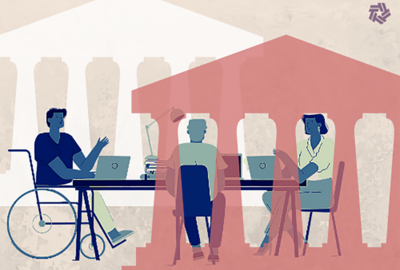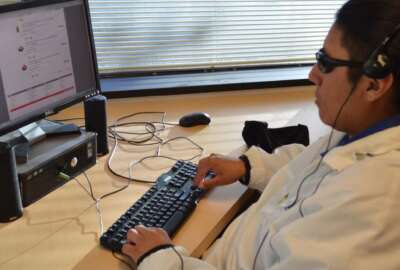State Department officer fights his way back from disease that left him permanently disabled
Collin Walsh was fully abled until one day, he wasn't. After a difficult two-year process of reinvention, he's now on his way to becoming a commissioned Foreign...
Best listening experience is on Chrome, Firefox or Safari. Subscribe to Federal Drive’s daily audio interviews on Apple Podcasts or PodcastOne.
The subject of disabilities can seem abstract to people who are fully abled. Collin Walsh was fully abled until one day, he wasn’t. After a difficult two-year process of reinvention, he’s now on his way to becoming a commissioned Foreign Service officer at the State Department. He shared his story on the Federal Drive with Tom Temin.
Interview transcript:
Tom Temin: Mr. Walsh, good to have you on.
Collin Walsh: Yes, sir. Thank you so much, very happy to be here.
Tom Temin: And if you don’t mind, tell us what happened that one day you were fully abled, and now you have disabilities?
Collin Walsh: Absolutely. So briefly, I was on my way to my dream job. I was to be a special agent in the Department of State’s Foreign Service. I was on my third day in the orientation in Virginia. And all of a sudden, I started feeling some weakness in my legs, some tingly feeling in my skin. And by the third day, I was unable to walk. I was essentially paralyzed from the chest down. And after many months, I learned that it was a very severe and sudden onset case of [multiple sclerosis].
Tom Temin: Wow, it sounds almost like polio. But we are vaccinated against that. So MS is something that’s just out of the blue for you, then?
Collin Walsh: Oh, I had no idea. And I was the most active guy. I was a active duty police officer, I was about to become a federal agent. I had traveled the world and then all of a sudden, I just I couldn’t move.
Tom Temin: Wow. So what happened both professionally and personally, at that point? Did you stay in the employ of the government under disability or tell us the technicals of what happened then?
Collin Walsh: The Department of State, my employer, and especially the Bureau of Diplomatic Security was wonderful with me. I had to leave for over two years in search for a cure and search for recovery. During that time, they allowed me to be on leave the entire time, despite the fact that I was only in their employ for three days at that point. But when I returned, I had to leave the Foreign Service. I was not capable of traveling overseas, etc., at that time, but I rejoined as a Foreign Affairs officer in the State Department’s Civil Service. And I’ve been there ever since.
Tom Temin: And just tell us somewhat what it takes to recover from the chest down, the paralysis under MS, is part of your function recoverable and have you recovered it?
Collin Walsh: That’s exactly what I was asking. When I asked that to my American team of doctors, no matter who I talked to, my prognosis was permanent paralysis, I was never going to recover, I was only going to get worse. So lucky for me, I married an Indian bride, and I listened to her. And she said, Collin, if the American doctors can’t help and don’t want to help, we’re going to take you to India. So that’s what we did. And we moved to India for a year. By the time I got back, I was on my two feet, walking still with trouble, I have issues, they’re visible, you could see them. But thankfully, I got much of my life back.
Tom Temin: And we are on video, which is simply for purposes of our eye contact and not for broadcast to our listeners. But I just saw you bring your hand up and pat yourself on the chest. So that means that your upper body is more mobile than initially.
Collin Walsh: Yeah, my upper body from roughly the chest up was always fine. So thank God that wasn’t affected. I’ve always had full use of my hands.
Tom Temin: And what in India can they do that seems unknown to US medicine?
Collin Walsh: Honestly, it’s the mentality. I really wasn’t on any different medication. But what I was on, I was in a house of people who were determined to make me stand and to make me walk. In the USA, you’re never going to get five people holding you for hours saying, put pressure on your legs when you don’t have any feelings in your legs. But that’s exactly what happened all day, every day. And it worked.
Tom Temin: And I imagined the mental recovery was probably just as difficult as the physical.
Collin Walsh: Oh, yes, it was. And let me tell you, I was so angry in India. I was, you know, shouting at the good people who were helping me saying, “I don’t have feelings in my legs, how could I put pressure on my legs?” And they would tell me to do it. And after weeks and weeks of this it worked, and I thank them, and I thank God for it.
Tom Temin: So you’re pretty good at choosing both employers and brides?
Collin Walsh: Yes, yes, I am.
Tom Temin: We’re speaking with Collin Walsh. He’s a Foreign Affairs officer in the Bureau of Diplomatic Security at the State Department. What sorts of accommodations then is the State Department making? And do they feel like they are adequate to support your career goals?
Collin Walsh: The State Department and my Bureau of Diplomatic Security as has been wonderful. Specific to me, I’ve had things like my office space restructured, special chairs, ergonomics, all that sort of thing. That’s standard. But what my bureau did and my request went way above and beyond, I started thinking beyond just my own needs. And I thought, well, we have an entire huge building of folks with disabilities. This building really is not accessible. How could I make this a wholesale effort? So I put together a campaign, I petitioned my bureau leadership and at the end of the day, which I should say at the end of quite a few months, I was able to get the entire building made accessible. That means all 24 floors have automatic door openers, accessible bathrooms, elevators that won’t close on people like me before I could get in them or close on people like me, which happens all the time. The key point is here: They were listening, and they wanted to help.
Tom Temin: And you mentioned 24 floors. So we’re not talking about Foggy Bottom, where is your office located?
Collin Walsh: It’s right on the river separating Georgetown from Rosslyn.
Tom Temin: Right, so you’re on the Virginia side there. Lots of tall towers over there. I’ve been in a few of them myself. And tell us about the work that you do now. And then we’ll talk about what work you’re training to become.
Collin Walsh: I work generally speaking in foreign affairs, international relations. The specific, I guess you could say subject matter of my work is security and counterterrorism. I’m a specialist in South and Central Asian affairs and international security issues.
Tom Temin: And your goal is to become a commissioned Foreign Service officer, which will take you overseas. How well equipped do you feel to be able to do that physically, and I guess, in your head?
Collin Walsh: Two separate issues: I’m very headstrong, and I’m very happy to meet and overcome and triumph in the face of any challenge. Physically, I do have issues, but by now I’m very well traveled throughout the bureaucracy. I know that the environment is right, to ask for what is necessary, I have experience doing it and I also have confidence in my department to make it happen because they’ve gone to great lengths to recruit folks like me with disabilities, both visible and invisible.
Tom Temin: And do you walk with difficulty, are you in a wheelchair, what’s your day-to-day mode of locomotion?
Collin Walsh: If I’m going long-term distance, I use a wheelchair, although I try very hard not to do it and I go weeks without doing so. Otherwise, I use elbow-supported walking sticks. And they’ve been very helpful to me. And I in fact, rely upon them. I don’t have the balance otherwise.
Tom Temin: Got it? And just what are the long-term prospects? I mean, this is the way life is and I guess what would you say to other people that become disabled, in how to cope if this is what the rest of your life is going to look like.
Collin Walsh: So it’s important to know that everyone’s situation is different. I was not born with a disability, I came to own one. As an individual, I make it my goal to do everything I can to continue to heal. And I have hopes and aims, ultimately, of getting back on my feet without assistance of anything and gaining back many of the functions I lost. However, I understand and I deeply appreciate that that’s not everybody’s goal, and maybe it cannot be. The point is this, if this is your goal, the federal government now more than ever, is ready, willing, and looking for guidance. How can we accommodate individuals with disabilities?
Tom Temin: Sounds like something every employer should be hearing?
Collin Walsh: I think so. And honestly, the educators are the community of the disabled. People with disabilities who seek employment who want to participate in the workforce, you need to understand that every single disability is individualized is unique. So there’s no one better than us who are capable of knowing what we need. And in fact, I don’t think there is anyone out there who would know what we need until we open our mouths and we communicate. That’s how you get things done. And that’s how you contribute.
Tom Temin: Collin Walsh is a Foreign Affairs officer in the Bureau of Diplomatic Security at the State Department. Thanks so much for joining me.
Collin Walsh: You’re very, very welcome. Thank you.
Copyright © 2025 Federal News Network. All rights reserved. This website is not intended for users located within the European Economic Area.
Tom Temin is host of the Federal Drive and has been providing insight on federal technology and management issues for more than 30 years.
Follow @tteminWFED





